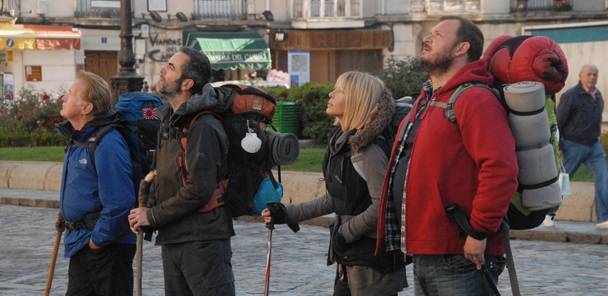The Way
Estevez clearly has something profound he wants to say to the world and it’s the clunky and repetitive manner that he chooses to deliver his messages that makes this film just so torturously predictable.
Plot summary
A father heads overseas to recover the body of his estranged son who died while traveling the "El camino de Santiago," and decides to take the pilgrimage himself.

In much of Emilio Estevez’s directorial back catalogue, he has drafted in family members to be the lead name on the marquee. With The Way, there’s this quite weird situation of Estevez directing his real-life father learning to cope with his son’s death. The son, of course, is played by Estevez which must’ve have felt a little bit like watching your own funeral, one in which you control your parent’s feelings, words and movements from beyond the grave. The Way is also dedicated to Estevez’s late grandfather. Let’s just be thankful Charlie Sheen wasn’t involved or things could’ve got really messed up.
In The Way, Tom (Martin Sheen) is an optometrist – an eye-doctor, which can’t possibly be an ironic metaphor for what is to come, could it? – who travels to France to pick up the remains of his son Daniel (Estevez) who has died unexpectedly whilst walking the El Camino de Santiago (otherwise known as The Way of St. James), a pilgrimage across the Pyrenees to Northwestern Spain.
In an attempt to discover the person his son really was, and as a sort of tribute to him, Tom decides to embark on the pilgrimage himself, where he meets an assortment of different characters/stereotypes along the way and, ultimately, has his eyes opened (oh, that’s clever, because he’s an optometrist, very good).
As you can see from the blindingly (no pun intended) simplistic optometrist metaphor, Estevez clearly has something profound he wants to say to the world and it’s the clunky and repetitive manner that he chooses to deliver his messages that makes this film just so totally, and torturously, predictable. It’s the unbridled reiteration of lines like “You don’t choose a life, you live one” combined with a soundtrack that seems stolen straight out of a Zach Braff film. There are songs from The Shins, Alanis Morissette, David Gray, Coldplay, etc, with lyrics that are so obvious that the audio may as well have been Estevez’s voice spelling out very slowly and clearly what exactly he was trying to say with the scene. It’s music that is unoriginal and, to be honest, very lazy.
The simplicity doesn’t stop there. For some reason, there is this overwhelming urgency to make things as easy as possible for the viewer, almost to the point of stupidity. There is an animated map that pops up between each stop on the pilgrimage which ‘helpfully’ tracks the path they have walked to their destination, which is a shame as it cheapens some of the more beautiful location shooting. It is just one of many things that put across the notion that viewers cannot keep up with the incredible pace that the film has set for itself, and that would make a bit more sense if the film wasn’t so damn plodding.
To be fair to Estevez, he is sticking to an established structure. Like many films before this, he has given his lead character an open road to give him a transformative experience. He then meets friends along the way that also happen to have transformative experiences. Sarah (an American women who is giving up smoking), Joost (a dutch man who likes recreational drugs and is trying to lose weight) and Jack (a writer who has writer’s block). All they are missing is a lion who needs some courage, a scarecrow that needs a brain and a tin man who wants a heart and they can all skip happily down the yellow brick transformative El Camino to Oz. And Estevez is a long way from home, in more ways than one.











COMMENTS